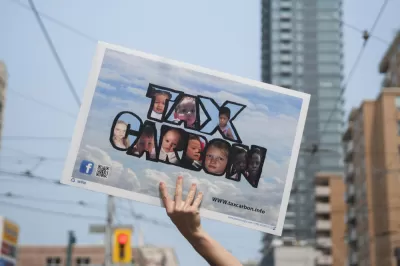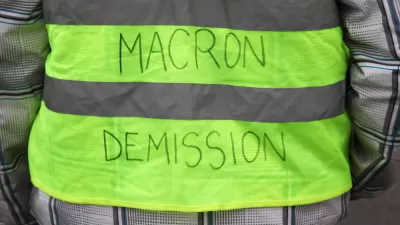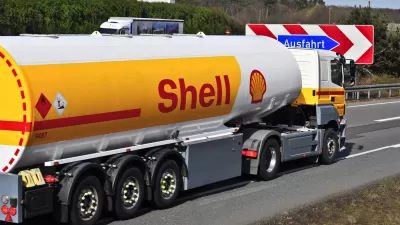Putting a price on carbon emissions is widely viewed as an effective tool to reduce emissions. It can also be applied to help those who stand to lose the most from climate change, thus enabling a socially just transition to a low carbon economy.

"Putting a price on carbon emissions can drive efficient emission reductions, spur innovation and allow businesses and households to choose how they reduce emissions," write Helen Mountford and Molly McGregor of the World Resources Institute (WRI), a global research organization. The article is largely based on research by Global Commission on the Economy and Climate in their 2018 report, The New Climate Economy.
Dealing with the disparate impacts of climate change on human population must become part of any climate action policy, the authors assert.
The effects of climate change will not be equitably distributed. Poor populations—those with the least capacity to adapt—will be hit the hardest by droughts, floods and other impacts. Women are particularly vulnerable to the impacts: For example, women and children are 14 times more likely to die during natural disasters than men.
Carbon policies, particularly those involving pricing, come with a risk to those who stand to suffer the most from climate change "if policies aren’t designed properly," add Mountford and McGregor.
The world saw this play out in France this month with the “Yellow Vests” protests. While the protests are clearly reflecting a wider anger over stagnant living standards and economic inequality, they were initially sparked in response to a rise in fuel taxes. The Yellow Vests protests, however, are not against climate action; rather, they are pro-equity, reflecting mounting dissatisfaction from rural and working-class citizens being left behind.
And this weekend, the protests continued, numbering 84,000 demonstrators on Jan. 12, up from 50,000 the previous week.
The good news is that the New Climate Economy’s 2018 Report describes how a low-carbon transition can, if managed well, deliver inclusive, sustainable growth. But, if poorly managed, there is real potential to exacerbate social exclusion, for example for workers and regions whose economies depend on coal mining.
Included among the strategies for investment of carbon pricing revenue is to "support the poor or other groups who are disproportionately affected by structural changes associated with the low-carbon transition," illustrating how carbon pricing "can be a powerful tool for supporting a just transition."
By contrast, most of the "Contribution Climat Énergie, a French version of the carbon tax," that was in the planned fuel tax hikes in France went toward deficit-reduction, with a smaller amount devoted to emission mitigation, and nothing toward addressing social inequities, write Mizan Khan of North-South University, Bangladesh, and Dereje Senshaw of the Global Green Growth Institute, South Korea, in an Inter Press Service opinion.
Mountford and McGregor of WRI examine a range of carbon taxes and other pricing policies in Chile, Columbia, Canada and the U.S. Pointing to the British Columbia carbon tax in Canada, they note that "[a]nalysis has shown that low and middle-income households are better off under that tax than they would be without it."
Similarly, Climate Action Incentive Payments, a key component of Prime Minister Justin Trudeau's carbon tax for four Canadian provinces that is intended to become operational this year, should disproportionately benefit, as opposed to burden, lower income households.
-
Compact Cities Are Environmentally and Economically More Sustainable, December 3, 2018.
-
Cutting Urban Emissions Could Save $17 Trillion, November 10, 2015.
-
Better Growth, Better Climate'—Guidance For Resource-Efficient Economic Development, September 17, 2014.
FULL STORY: A Carbon Price Can Benefit the Poor While Reducing Emissions

Maui's Vacation Rental Debate Turns Ugly
Verbal attacks, misinformation campaigns and fistfights plague a high-stakes debate to convert thousands of vacation rentals into long-term housing.

Planetizen Federal Action Tracker
A weekly monitor of how Trump’s orders and actions are impacting planners and planning in America.

In Urban Planning, AI Prompting Could be the New Design Thinking
Creativity has long been key to great urban design. What if we see AI as our new creative partner?

King County Supportive Housing Program Offers Hope for Unhoused Residents
The county is taking a ‘Housing First’ approach that prioritizes getting people into housing, then offering wraparound supportive services.

Researchers Use AI to Get Clearer Picture of US Housing
Analysts are using artificial intelligence to supercharge their research by allowing them to comb through data faster. Though these AI tools can be error prone, they save time and housing researchers are optimistic about the future.

Making Shared Micromobility More Inclusive
Cities and shared mobility system operators can do more to include people with disabilities in planning and operations, per a new report.
Urban Design for Planners 1: Software Tools
This six-course series explores essential urban design concepts using open source software and equips planners with the tools they need to participate fully in the urban design process.
Planning for Universal Design
Learn the tools for implementing Universal Design in planning regulations.
planning NEXT
Appalachian Highlands Housing Partners
Mpact (founded as Rail~Volution)
City of Camden Redevelopment Agency
City of Astoria
City of Portland
City of Laramie




























